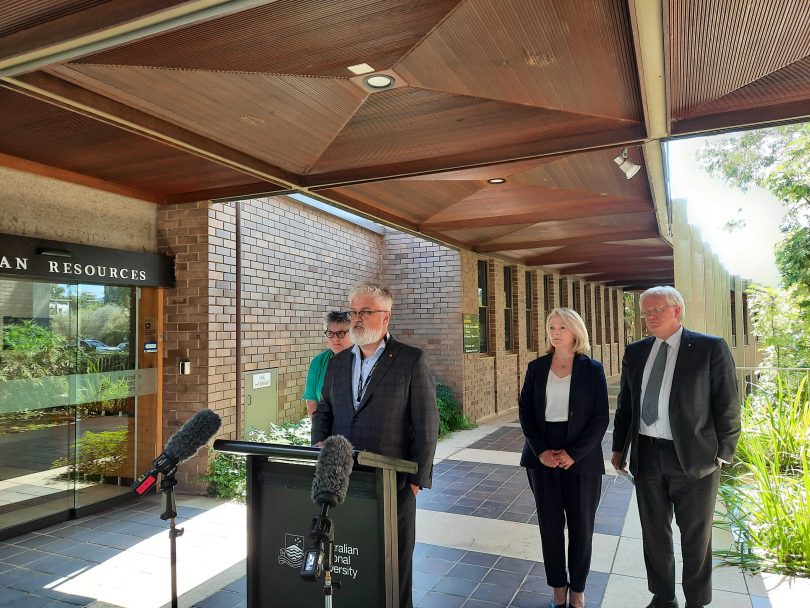
Professor Sally Wheeler (Deputy VC, International), Professor Ian Anderson (Deputy VC, Student and University Experience), Grady Venville (Deputy VC, Academic) and Vice-Chancellor Professor Brian Schmidt. Photo: Ian Bushnell.
All new ANU students will have to undergo sexual consent training and management of its residential halls will be overhauled in the next phase of the University’s ongoing work to prevent and respond appropriately to sexual assault and sexual harassment on its campus.
The ANU today launched its $3.3 million Student Safety and Wellbeing Plan, which it says directs initiatives and money where it believes they can make the biggest difference.
These include boosting staff in ANU residences, recruiting new case managers, making consent training a mandatory part of students’ enrolment from 2023 and taking a zero-tolerance approach to sexual assault and sexual harassment across the University.
The Plan springs from the recommendations of the independent review of the ANU’s Sexual Violence Prevention Strategy launched in 2019, also released today, and feedback from victims/survivors themselves.
The ANU’s disclosure report released earlier this month shows that reporting of alleged sexual misconduct is rising as awareness also increases.
Vice-Chancellor Professor Brian Schmidt said the aim was to support and care for victims/survivors and to make perpetrators face the consequences of their actions.
“Like every community and institution in Australia, ANU is confronting the scale and tragedy of sexual assault and sexual harassment,” he said.
“We’ve been listening to victims/survivors, their advocates and experts in the field and we’ve taken strong action.
“But it is clear from the independent review and continuing evidence from our improved reporting systems that we need to do more and we need to act now.”
Professor Schmidt said this would mean more professionally trained staff in residences and that all staff undertake training on student safety and consent.
Deputy Vice-Chancellor (Student and University Experience) Professor Ian Anderson said the residences would be a key focus for the ANU over the next 12 months.
He said there would be 14 additional staff in residences, including a group skilled in human development, and four more case managers to provide more timely responses to complaints.
He said the mandatory training would be a combination of the current online tool Consent Matters, and the face-to-face Enlivening Consent program, which was a richer and more effective process and had been received an overwhelmingly positive response.
READ ALSO: Canberra’ switched on’ to grasp economic opportunities
For some students these programs had been their first encounter with the issue of sexual consent, Professor Anderson said, suggesting it is an area that schools should become more involved in.
He said there would be monitoring and evaluation of the programs to ensure they were working effectively and not just a box-ticking exercise.
The ANU will offer as much care and support as possible to victims/survivors, but it will be up to a complainant to go to the police.
Those accused of unacceptable behaviour will be subject to a disciplinary process that could result in them being expelled from the University.
Last year there were 31 reports and 21 people were found to have engaged in misconduct. A little more than half were expelled.
Professor Schmidt said the message to victims/survivors was that ANU was on their side.
“We will do everything we can to support you to make sure you get the care you deserve, that you have access to simple safe and support systems to report cases of sexual harassment and assault, and ensure justice is served.”
He said perpetrators were not welcome at the ANU.
Professor Schmidt said there would not be any finish line in this process, but ongoing strategies, oversight and evaluation.
The ANU will also tailor programs to cater for its culturally diverse community.
It has accepted and will implement all recommendations of the independent review in a two-year process that will include consulting student leaders, advocates and survivors along the way.
The Plan builds on work, including the Sexual Violence Prevention Strategy, that the ANU has undertaken since the landmark 2017 Australian Human Rights Commission’s Change the Course report.
It has established the Respectful Relationships Unit to lead education on consent and connect survivors with support services when they need it, employed case managers, established a specialist Student Safety and Wellbeing team, launched an online disclosure tool and published a sexual misconduct policy.

















